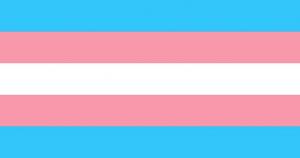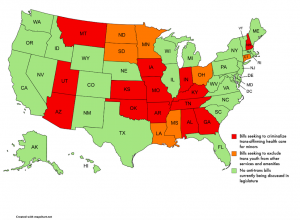Part One; Part Two; Part Three; Part Four; Part Five

I’d like to address a few more misconceptions about trans people that are common among Christians. Many of them are rooted in the media, both in entertainment and in the news—and even honest and unbiased news can foster misconceptions, since its primary job is to report on bad or exceptional things, not on ordinary ones.
1. That trans people are following a trend of rebelling against gender norms for the mere pleasure of rebellion. I don’t think I know anybody who would pour thousands of dollars into surgeries and changes of legal documentation, along with incessant harassment of every kind from passive-aggressive remarks to violent assaults on their lives, merely for the pleasure of annoying their parents. I dare say a handful of such people exist, simply because human beings are very weird creatures; but (reckoning people who are in some sense trans at about half a percent of the populace) I decline to believe that there are seven and a half million people quite that dedicated to what, on that showing, amounts to a prank.
It also so happens that plenty of people who transition, whether to gain acceptance for their gender identity or out of mere personal preference, are as typical and even stereotypical of their gender as anybody. Even if that were a form of rebellion, it wouldn’t be rebellion against society’s gender norms.
2. That trans people believe you can choose whatever gender you like. Now, this is a little ticklish. There are trans people who say this—although for what it’s worth, the only trans people I’ve heard say it are ex-Catholics who seem to be saying it as a “fuck you” to a Church that’s deeply hurt them, so it’s difficult to say whether and in what sense they mean it. In any case, most of the trans people that I’ve met or read have insisted that their gender identity is very much a part of them and not a mere personal preference, as unchosen as the anatomy they also didn’t choose. Many documents from the Vatican and the USCCB seem entirely unaware of this, vaguely categorizing trans identities as manifestations of a “gender ideology” that sees nothing at stake but personal autonomy; this does not reflect most of what I’ve actually heard and read from trans people.

3. That trans people are really just gay. I mean, sure, some trans people are gay; some are straight. (1) Some are bisexual, and others still are asexual. Conflating gender identity (a person’s inner sense of self) with sexual orientation (whom they are attracted to) is not the winning strategy it looks like at first blush. It really doesn’t explain anything.
4. That trans people are promiscuous, deceitful sexual predators. To anyone even casually familiar with the lived experience of trans people, this notion is a bad joke. Trans people are victims of sexual violence and exploitation at shockingly high rates when compared to cis people: close to 10% of cis people report being sexually assaulted at some time in their lives, while trans people report molestation at rates nearly five times higher. (2) And these are just the assaults that get brought to the attention of the law, and just the sexual assaults. Violent attacks upon trans people—with or without prior sexual contact—are also horrifically common.
Why trans people are subject to molestation and violence of these kinds is less easy to pin down, because there are several factors at work. Societal condemnation and disgust towards trans people is certainly a contributing factor, both directly and indirectly: directly, in the sense that it tends to minimize and excuse violence against trans people; and indirectly, in that it shames men who are attracted to trans women, which in turn gives them a strong psychological reason to displace their defensive anger onto their trans partners. (3) Additionally, both because their bodies are fetishized (usually as something forbidden and/or exotic) and because there are few legal protections in the workplace for trans people, some turn to various kinds of sex work, (4) which are often dangerous.

5. That accepting trans people will allow dangerous sexual predators posing as trans people to sneak into gender-segregated spaces with malicious intent. I would mildly point out that not accepting trans people does literally nothing to prevent this. In the notorious bathroom bills, for instance, the people who are aghast at the notion of a trans woman being in the same bathroom with their daughters don’t seem to have considered that the alternative is having that trans woman in the bathroom with their sons.
But more than that, when we take people who transition into account, not accepting trans people actually gives such predators, if there are any, more cover and not less. A trans man who was born with female anatomy but has been on hormones for a year is going to look, well, pretty masculine, including a flat chest and a beard as likely as not. That trans man looks like a man. And your idea of preventing gender confusion and possible abuse is to tell a person who looks like a strapping six-foot mountaineer to use the ladies’ room?
(1) The funny thing is, it’s true to say that some transgender people are gay and some are straight no matter what your beliefs about gender identity are.
(2) Savvy readers may observe that I cited sources using two different studies to obtain an estimate of sexual violence against trans people. Savvier readers may also observe that, lest I be accused of juggling numbers to make the trans plight more sympathetic, I used the lower of the two estimates of assault against trans individuals.
(3) This remains true, regardless of whether it’s right or healthy for men to be attracted to trans women. Even if it were wrong, it would still be inexcusably wrong for a man to vent his rage in this way—and if it is indeed the duty of society to inculcate shame, it would be society’s duty to inculcate a stronger shame against violence aimed at the objects of our lusts.
(4) Yes, sex work is work. Being a job doesn’t make it right, any more than being wrong makes something not a job. Being the CEO of a usurious company that underpays and exploits its workers is a job too (oh hi Amazon, I didn’t see you there).
Images via Pixabay
















